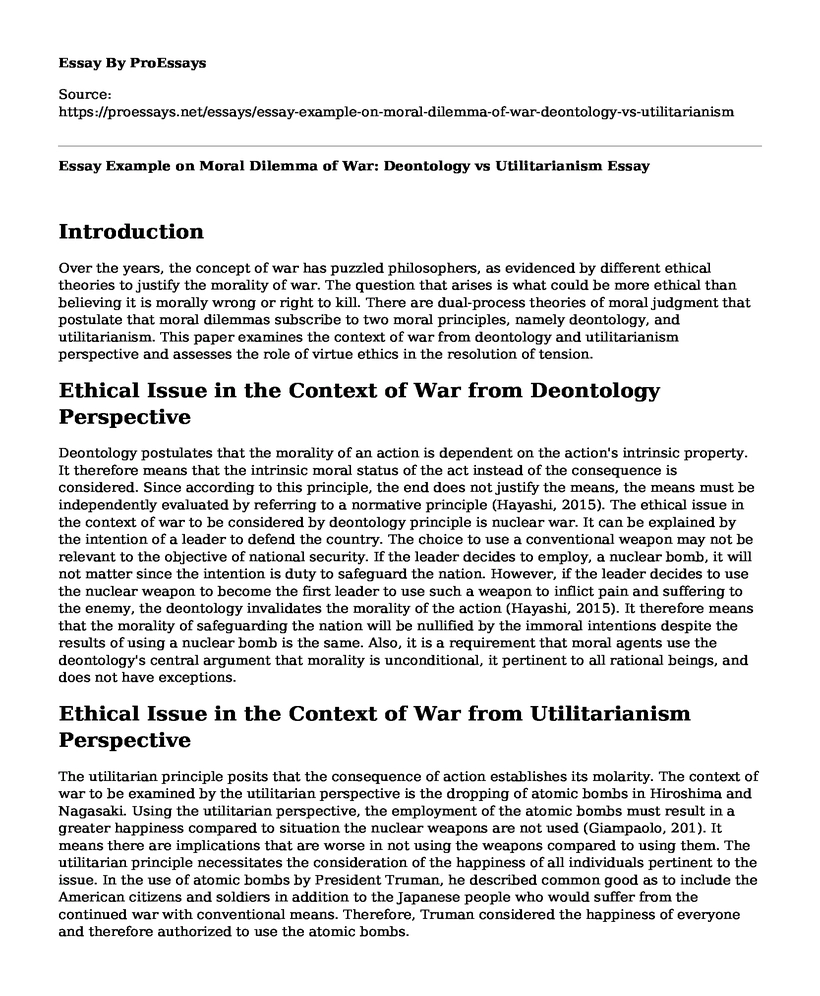Introduction
Over the years, the concept of war has puzzled philosophers, as evidenced by different ethical theories to justify the morality of war. The question that arises is what could be more ethical than believing it is morally wrong or right to kill. There are dual-process theories of moral judgment that postulate that moral dilemmas subscribe to two moral principles, namely deontology, and utilitarianism. This paper examines the context of war from deontology and utilitarianism perspective and assesses the role of virtue ethics in the resolution of tension.
Ethical Issue in the Context of War from Deontology Perspective
Deontology postulates that the morality of an action is dependent on the action's intrinsic property. It therefore means that the intrinsic moral status of the act instead of the consequence is considered. Since according to this principle, the end does not justify the means, the means must be independently evaluated by referring to a normative principle (Hayashi, 2015). The ethical issue in the context of war to be considered by deontology principle is nuclear war. It can be explained by the intention of a leader to defend the country. The choice to use a conventional weapon may not be relevant to the objective of national security. If the leader decides to employ, a nuclear bomb, it will not matter since the intention is duty to safeguard the nation. However, if the leader decides to use the nuclear weapon to become the first leader to use such a weapon to inflict pain and suffering to the enemy, the deontology invalidates the morality of the action (Hayashi, 2015). It therefore means that the morality of safeguarding the nation will be nullified by the immoral intentions despite the results of using a nuclear bomb is the same. Also, it is a requirement that moral agents use the deontology's central argument that morality is unconditional, it pertinent to all rational beings, and does not have exceptions.
Ethical Issue in the Context of War from Utilitarianism Perspective
The utilitarian principle posits that the consequence of action establishes its molarity. The context of war to be examined by the utilitarian perspective is the dropping of atomic bombs in Hiroshima and Nagasaki. Using the utilitarian perspective, the employment of the atomic bombs must result in a greater happiness compared to situation the nuclear weapons are not used (Giampaolo, 201). It means there are implications that are worse in not using the weapons compared to using them. The utilitarian principle necessitates the consideration of the happiness of all individuals pertinent to the issue. In the use of atomic bombs by President Truman, he described common good as to include the American citizens and soldiers in addition to the Japanese people who would suffer from the continued war with conventional means. Therefore, Truman considered the happiness of everyone and therefore authorized to use the atomic bombs.
Virtue Ethics in Tension Resolution
Virtue ethics or ethics of characters defines the human qualities possessed by an individual to be regarded as a moral person. The ethics of character can help resolve tension when encountered with ethical issues in the context of war. It is important as it defined right action in time of war which is not about the estimation of aggregate utility or adhering to universalisable guidelines but in ensuring that actions are fair, kind, and courageous among others (Steyl, 2013
References
Giampaolo, K. (2016, February 4). Deterrence or Disarmament?: The Ethics of Nuclear Warfare. Retrieved April 14, 2020, from https://www.carnegiecouncil.org/publications/articles_papers_reports/766
Steyl, S. (2013). What can Virtue Ethics Offer Pacifists? Retrieved April 14, 2020, from https://www.otago.ac.nz/ncpacs/otago668338.pdf
Hayashi, N. (2015). On The Ethics of Nuclear Weapons: Framing a political consensus on the unacceptability of nuclear weapons. Retrieved April 14, 2020, from https://www.unidir.org/files/publications/pdfs/on-the-ethics-of-nuclear-weapons-en-627.pdf
Cite this page
Essay Example on Moral Dilemma of War: Deontology vs Utilitarianism. (2023, May 03). Retrieved from https://proessays.net/essays/essay-example-on-moral-dilemma-of-war-deontology-vs-utilitarianism
If you are the original author of this essay and no longer wish to have it published on the ProEssays website, please click below to request its removal:
- Film Analysis Essay on Two Greatest Wars in World History: WW I and WW Ii
- Women and the Bible Essay Example
- Essay Sample on Cultural Differences and Communication Difficulties
- Essay Sample on Effective Communication: Essential for Society, Scholars & Practitioners
- Mergers/Acquisitions: Addressing Ethical Dilemmas for Company Success - Essay Sample
- Annotated Bibliography Example on Marital Stress Worsens Prognosis in Women with CHD
- Free Paper on Why Our Families and Friends Mean More in the Development of Our Success







